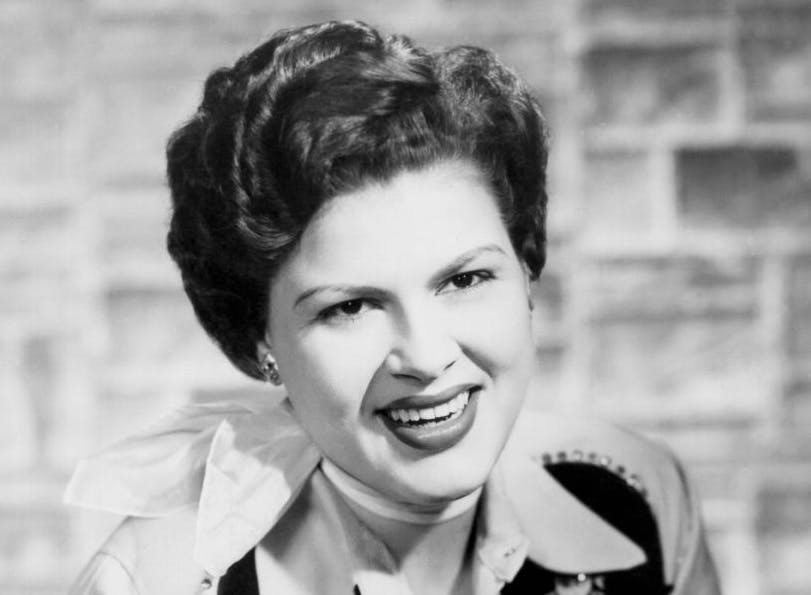The Staying Power of Patsy Cline’s Strut
Sad, beautiful, and moving, Cline’s ‘Crazy’ is like the life that Margaret Jones presents in her biography of the singer who died in an airplane crash in 1963, at just 30 years old.

‘The Life and Times of Patsy Cline’
By Margaret Jones
Foreword by Loretta Lynn
University of Illinois Press/Country Music Foundation Press, 326 pages
Now in a third revised paperback edition, this standard biography of country singer/crossover artist Patsy Cline is a powerful and poignant portrait of a woman the Nashville Banner described as “strutting out of the pages” of Margaret Jones’s book.
Cline died in an airplane crash in 1963, just 30 years old, yet her impact only grows. Part of her staying power has to do with that strut. Although her biographer details the times when men did her wrong, and her own community disrespected her, she prevailed.
Loretta Lynn gets the biography off to a rousing start by recalling the sense of sisterhood she shared with Cline, who looked out for her — insisting the two of them be interviewed together — and declaring an undying loyalty to Lynn.
Cline grew up at Winchester, Virginia, which is where Ms. Jones sets her first scene in May 1957, with Cline, already a success, lamenting: “I don’t know what’s wrong with this town. It’s like they don’t want a person to make anything of herself.”
As Ms. Jones explains: “In Virginia, nothing could be more important than certified blue blood.” Poor Patsy Cline had none, but in her own estimation, that did not make her poor. Singing country music in a cowgirl outfit impressed no one in Winchester, but for Cline what mattered was the music, which took her all the way to a performance at Carnegie Hall.
What is it about Patsy Cline that made her one of the first country music singers to attract fans all over the country, from Nashville to New York and beyond? Certainly her robust voice commanded respect, but so did her acute understanding of what songs were right for her.
When Willie Nelson pitched “Crazy” to her, she did not hesitate in doing the recording that became a major hit. Anyone who has listened to Patsy Cline is already humming or singing the song: “I’m crazy for trying and crazy for crying/ And I’m crazy for loving you.”
Cline, at the beginning of the song, hits that high note on “lonely,” breaking the word into two grieving, almost hiccupy syllables in such a plaintive, obsessive way, which is then counterbalanced by the emphasis on feeling so blue — paradoxically mournful yet uplifting because of her strong voice.
Cline stands, perfectly composed, her hands behind her back, and then, middle way through, she brings them forward in a clasp, ending the song with her head bowed, delivering a lament with such a still poise and confidence.
Sad, beautiful, and moving, “Crazy” is like the life that Margaret Jones presents in her biography — plus an exuberance and persistence even when ridiculed by the New York Journal-American gossip columnist, Dorothy Kilgallen, who announced Cline’s Carnegie Hall appearance with other Grand Ole Opry regulars as being “hicks from the sticks.”
Cline was not one to suffer setbacks or ridicule. Ms. Jones quotes her subject’s riposte to Kilgallen: “At least we ain’t standing on New York street corners with itty-bitty cans in our hands, collecting coins to keep up the opera and symphonies.”
Here’s how Cline handled any suspicion that she had sold out to the elitist New Yorkers. “We were awfully proud of being that fur up in high cotton,” she confided to an Atlanta audience. Ms. Jones suggests Cline wanted it known that she had not sold out by going “pop.” Cline had not become a member of the Winchester Country Club.
I suppose it could be said that Patsy Cline put on an act as a country singer, but then she was the act, and she never did fall to pieces, as one of her other major hits had it. She was still recording a month before her untimely death.
I’ll let Loretta Lynn have the last word, which I suspect resonates with the millions who still listen to Patsy Cline: “So when I get troubles with my voice or other problems, I tell myself I can get through this because Patsy is here with me. And she is, just like she said she always would be.”
Mr. Rollyson, the author of “American Biography, hosts a podcast, “A Life in Biography.”

